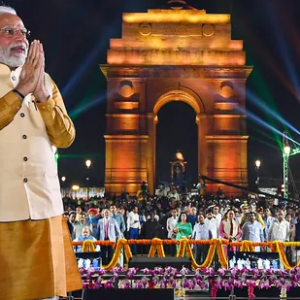Now that the Uniform Civil Code (UCC) debate is once more upon us it is time that those of us committed to the idea of an UCC think about what should be our strategy to achieve that objective.
It is important to note right at the beginning that the UCC was inserted as a Directive Principle of State Policy (Article 44) at the time of the formation of the Constitution. It was then perceived to be a strongly liberal and modernist provision in the Constitution. Till the 1970s the provisions regarding UCC was right on top of the agenda of the leftists and liberals. Even during the 1980s the UCC was the demand of the leftists and liberals who perceived it to be a panacea for all ills arising out of traditional backwardness and religiosity.
The entire fiasco of the Muslim Women’s (Protection of Rights on Divorce) Act, 1986 and the Shah Bano judgement arose out of the perception of the liberal intelligentsia that the key to the modernisation of Indian society was the modernisation of personal laws. The liberal intelligentsia in the sequence of incidents came up against the whirlwind of Islamic fundamentalism which in the 1980’s was emerging as a key opponent to modernism. That specific incident and the craven surrender of a supposedly liberal and modernist government to the threat of violence by Islamic fundamentalists resounded all over the world. In global politics that surrender was followed by the issuance of a fatwa against Salman Rushdie and resurgence of Islamic fundamentalism as an ideology and a method of governance.
In the face of this resurgence it was surprising that instead of confronting this completely illiberal resistance to liberalism and modernisation, the liberals in fact switched over to supporting the Islamic fundamentalist position in relation to the UCC. In fact so complete was the switchover that the liberals, during this high noon of Islamic fundamentalism, actually started equating the UCC with manifestation of religious majoritarianism in India .This resulted in a strange situation where only the nationalists were left with supporting the UCC. In fact this issue had become so radioactive that when the NDA government was formed, it was widely perceived to have put the issue of implementation of the UCC on the backburner. Large parts of the liberal intelligentsia thought that this was a positive development.
It seems that the country is going through another discussion in relation to the UCC. This discussion would mean that besides the nationalists there would be different voices which would have a role in deciding the trajectory of the UCC debate. The rest of the present article would consist of broadly discussing the positions of different groups of people who could be expected to be a part of this debate.
The first would be the liberals. As mentioned before, the liberals have continuously prevaricated about their actual standing in relation to the UCC. While in the first 40 years of independence, UCC was a major objective in their manifesto to make India a modern state, in the subsequent 27 years they have treated the UCC as an exercise in majoritrianism. It seems that there is again a turn in the liberal position where there seems to be an increasing section which now realises that the first proposition was possibly the correct position considering the way Islamic fundamentalism subsequently evolved. It can be expected that sections of the liberals would be more forthcoming and helpful in the formation of the UCC now than they were at any time in the last 30 years.
The second would be the feminists. The feminists are also in a dilemma and along with the liberals have also gone through the long arc of first backing and then dissociating themselves from the UCC. At first the UCC was seen as an emancipatory legislation. Subsequently, it was perceived to be a majoritarian attempt to dominate the feminist discourse. The argument put forward was that societies and especially minority communities had to reform from within and women’s rights had to be contextualised in terms of the culture of the minority group. This resulted in the anomalous position whereby feminist groups would promote radical gender equality amongst the majority community while supporting open discrimination as long as the same was practised by the religious minority. However it seems also that this time some of the feminist groups may be willing to come out and support a UCC or a legislation which would have a similar objective.
The third group would be Muslim women’s groups who have been agitating for equality within Muslim law. Needless to say how far this group would be willing to support a UCC is something which needs to be tested. This is especially relevant considering that the attempt of the traditionalists would be to paint the UCC as a majoritarian project.
The fourth group would be the Muslim traditionalists who may be divided into two groups; the first completely rejecting any intervention in the personal law of Muslims and the second, who would like to carve out an exception for Muslim law but also, would accept incorporation of progressive elements within the law. Historically the latter group has been more powerful politically and the former more powerful socially within the Muslim community.
There would also be various different groups from within various religious minorities and even from within the religious Hindu majority who would be opposed to a UCC on the ground that the same would possibly destroy the sanctity of personal law as well as the distinctiveness of various groups and their ancient practises . The arguments would possibly be made on the grounds of plurality. It is surmised that the whole overwhelming objection would come from traditional elements within such groups who would perceive the UCC as a threat to their control of the lives of the members of their groups. Needless to say that during the last attempt to legislate a Hindu code there was great resistance from the Hindu community itself.
The broad question Constitutional question at the centre of the debate would be as to whether equality is an absolute value or as the Supreme Court has said numerously, existence of equality can only be amongst equals, and that all communities are different.
Broadly there seems to be two possible methods to deal with the issue of incorporating greater egalitarianism within various personal laws. The first is the UCC and the second is a judicial process.
If we adopt the first, then it is very important that the nationalists would need to create a broad coalition to bring on-board various groups, described above, in different compositions. This would also mean taking on board the concerns of the different groups. If the UCC is to succeed, under no circumstances can the UCC have the flavour of being partial to any religious group. This would mean that the process of evolution of the UCC would ensure a constant conflict between those who perceive the society as an aspirational, uniform entity and those who perceive society to be an association of various groups. Under the circumstances any concession to any group would result in other groups perceiving that they were being discriminated against. More than consensus on the idea of UCC which itself is debatable, there would be even greater conflict on what would be the actual provisions of the UCC. Even if all groups were to actually agree to an UCC, it would be very difficult to get them to agree to a draft bill acceptable to all.
It is therefore suggested that a better way may be to approach personal laws through the prism of civil liberties legislation in the area of personal law. The strategy of the said Bill would be to do away with any inequality to any individual in any of the different personal law. It would be a statute which would strictly be based on Constitutional values. This would also effectively mean that the law would ensure that specific exceptions in personal law which create inequalities are either done away with or are equalised. For example in a divorce all grounds which are available to a Hindu male should be available to a Hindu female, and similarly the same would be applicable to divorce and polygamy in Muslim law and tribal customs. This would ensure that specific groups would not be able to make an argument that the law is skewed towards the agenda of any of the groups while bringing personal laws in consonance with the Constitution.
The other option is to bring in this radical equality through judicial interpretation where the Courts can make personal laws subject to fundamental rights, which as of now, they are not. The Courts can also apply fundamental rights to all personal laws, especially the Right to Equality. The Right to Equality is fundamental to our Constitution and there can be very little objection in granting equal status to all persons within specific groups. No one can justify heavenly ordained discrimination because it would go against the principles on which the State is governed, namely the Constitution of India. If there is one agreement amongst all the above groups it is about the primacy of the Constitution. However this is a strategy which requires strong judicial will and whether the judiciary would be able or willing to take such a strong stand after the fiasco of Shah Bano remains to be seen.
The present government, committed to the new aspirational Indian, is obligated to ensure that no person is discriminated against. Equality before law of every person in society regardless of his/her individual background is the key to create a modern state and economy. Multiplicity of laws and legal regimes in relation to property holding, individual relationships and property rights are fetters on social and economic progress. Social, political, religious and personal discrimination is anathema to the ethos of the egalitarian and emancipatory vision of the Constitution and on that ground alone,discriminatory personal laws have no place in the legal regime. However India having a storied history and an ancient civilisation, personal laws are tied with prickly sensitivities. This is specially so because they have served as the basis of the old colonial policy of ‘divide and rule’ and have been deeply politicised .Therefore, the initiation of the debate on UCC is to be greatly appreciated because it is the first step towards confronting an issue which is clearly holding back Indian society from growing into an egalitarian and modern one.
The author is an advocate at Supreme Court of India. The views expressed are his own.


